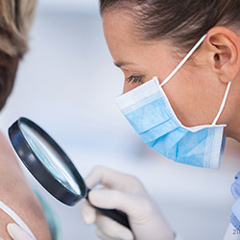-
August 20: The Week in Cancer News
Patient volume at radiation therapy clinics can affect outcomes, and experts call attention to a third breast cancer gene, PALB2.
by Marci A. Landsmann
-
August 13: The Week in Cancer News
Survival is not affected by delaying breast cancer treatment for fertility preservation, and the FDA approves a drug combination to treat kidney cancer.
by Kevin McLaughlin
-
Drug Delays Recurrence in People With Early-Stage Breast Cancer
People who have inherited BRCA mutations and are at high risk for cancer recurrence may benefit from a PARP inhibitor.
by Pamela Rafalow Grossman
-
July 30: The Week in Cancer News
Healthy lifestyle habits can reduce risk of cancer, and less treatment may be adequate for some children with ALL.
by Marci A. Landsmann
-
July 23: The Week in Cancer News
Two studies on access to opioids identify disturbing patterns, and Keytruda before and after surgery helps some breast cancer patients.
by Kevin McLaughlin
-
Remote Care
After adapting remote patient monitoring programs to cancer patients with COVID-19, cancer centers delve deeper into the programs' value for cancer patients undergoing treatment.
by Jon Kelvey
-
July 16: The Week in Cancer News
A study measures the global impact of alcohol on cancer incidence, and the FDA approves treatments for multiple myeloma and urothelial cancer.
by Bradley Jones
-
Moving Away From the Maximum Tolerated Dose
The FDA recently expressed a new commitment to testing cancer drugs at lower doses, rather than defaulting to the highest dose most people can tolerate.
by Marcus A. Banks
-
July 9: The Week in Cancer News
Study shows cancer centers can improve coordination with physicians' practices in their networks, and cancer death rates in U.S. continue to decline.
by Marci A. Landsmann
-
July 2: The Week in Cancer News
A study sheds light on the link between red meat consumption and colorectal cancer, and mRNA COVID-19 vaccines are effective in most cancer patients.
by Kevin McLaughlin
Cancer Talk
An Evidence-Based Guide to Integrative Medicine
ASCO and the Society for Integrative Oncology issue recommendations for integrative medicine approaches that have been supported with research.
by Teresa Bergen
A Look at Disparities Across Cancer CareA new AACR report tracks progress in addressing cancer health disparities and identifies work that still needs to be done.
by Eric Fitzsimmons
Credit Agencies to Remove Some Medical Debt From ReportsChanges to what medical debt is included in credit reports could give patients more time to resolve outstanding bills.
by Karon Warren
The Mental Toll of a Cancer DiagnosisNew studies shine a light on the effects of a cancer diagnosis on mental health and suicide risk.
by Pamela Rafalow Grossman















